Chios at Breaking Point: New Research Finds Humanitarian Support Must Be Strengthened, Not Withdrawn
Posted:
Time to read:
Guest post by Mohamad Alhussein Saoud and Marta Welander. Mohamad is the chief statistical analyst at Refugee Rights Data Project (RRDP). Mohamad has a BA and an MA in Economics from Aleppo University, Syria, and an MA in Democratic Governance and Human Rights from the European Inter-University Centre for Human Rights. He is currently based in Germany, where he works at Magdeburg University on a project about refugees and migration in Germany. Marta is the executive director of Refugee Rights Data Project (RRDP) and a visiting lecturer and doctoral researcher at the University of Westminster. Prior to founding RRDP in 2016, Marta worked as Deputy Director for a small international human rights and peacebuilding organisation. In this post they set out findings from a recent study of conditions on Chios.
New research by Refugee Rights Data Project (RRDP) finds that the island of Chios, Greece is at breaking point. The continued arrival of refugees from conflict-ridden countries has led to chronic overcrowding, while charities and NGOs operating on the island are struggling to provide some of the most basic services required.
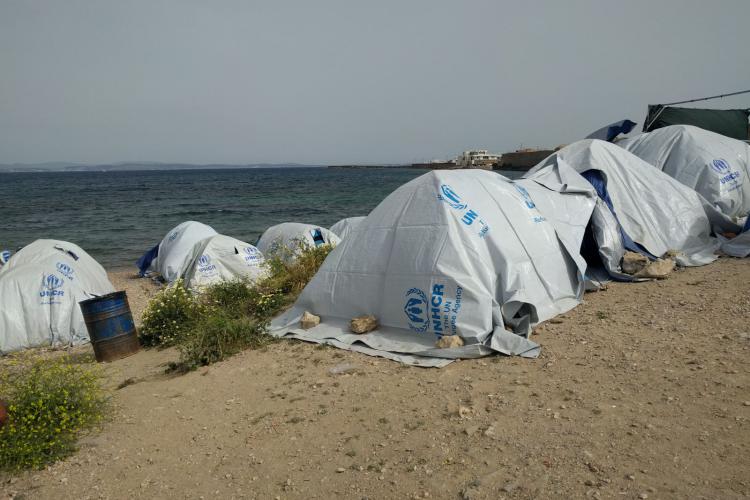
Critical living conditions
The living conditions in Chios are inadequate. Large numbers of people, including many families, are residing in small and fragile tents. Camps are so overcrowded that people are forced to sleep in the street; in particular, newly arrived refugees. ‘When I arrived in November last year, I slept in streets for two weeks until I found a place to sleep inside the camp,’ one refugee told RRDP researchers. The shortage of shelters pushes people to take drastic measures. ‘We went to the city center, and when we came back, another family occupied our tent’ a group of refugee women recounted.
In general, the living environment is unsanitary and dirty. The Souda camp attracts rats and insects, due to its proximity to a drainage pipe extracting dirty water from the nearby city. ‘I created a high sleeping place inside the tent for my child in order to keep her away from rats,’ one respondent told us.
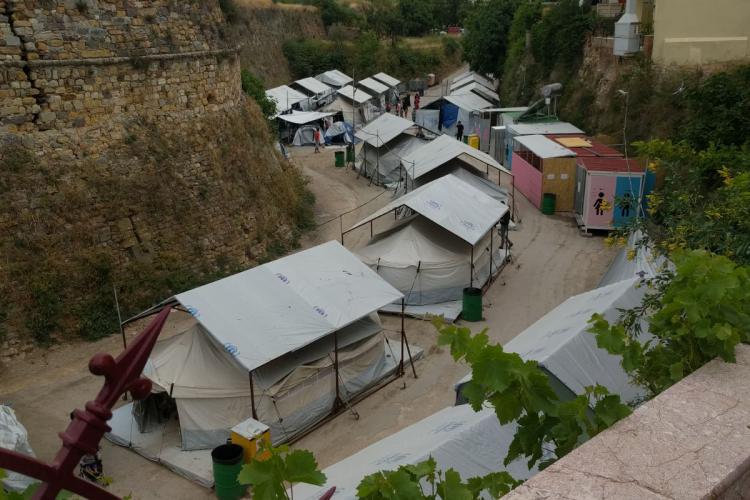
Meanwhile, hot water is a rare currency for refugees in Chios. For instance, in Souda camp, hot water is only available for a few hours per day. In Vial camp it is lacking entirely. ‘I come from Vial to Souda just to have a shower,’ one respondent explained. The situation is particularly dire in Vial, as there is no water available in the toilets.
Access to adequate food is also a major problem in Chios. Spoiled food is commonplace, with many respondents reporting having suffered from food poisoning: ‘I gave up eating the food that we received after I was poisoned a few months ago,’ one person told us. Another group explained, ‘It’s happened twice in our camp that people were poisoned by food’.
Lack of medical services
Despite immense efforts by charities on the ground, there is an evident shortage of services in Chios. The most striking shortcoming relates to medical care. The majority of people with a health issue (71.5 %) said they did not receive any medical help in Chios. One refugee interviewed by RRDP explained his frustration about the lack of medical care by suggesting sarcastically, ‘if you were dying, the doctor would give you a painkiller tablet, but just one tablet.’ Another interviewee who had sought medical help for a broken bone in his face was met by an outright hostile approach at the medical centre, where the doctor said: ‘Did you come here to make your dreams come true?’ and refused to provide medical care.
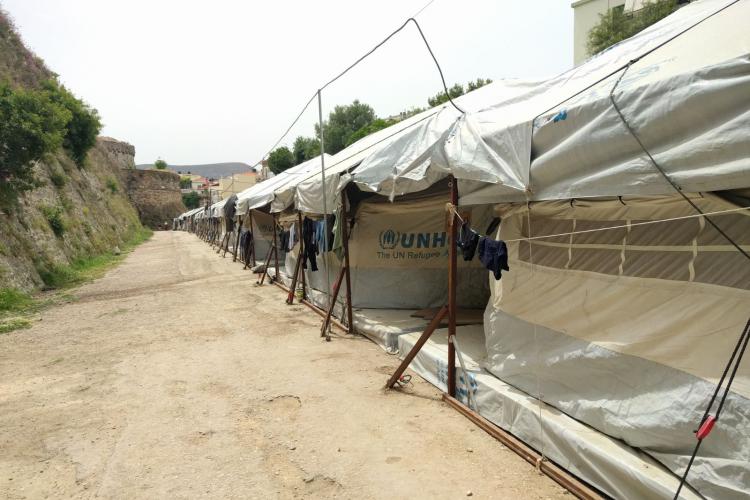
A key concern relating to medical care was the long delay to receive help. One woman with cervical cancer had waited for more than two weeks before she was able to go to Athens to receive adequate care. Many reported long waiting times in obtaining a diagnosis in the first place; in particular, for problems relating to mental health. For instance, one Iraqi man suffering from an acute psychological issue waited for six months to get a diagnosis. He told RRDP researchers that he feels like he’s suffocating in the camp and has therefore left. ‘I cannot sleep in the camp, I have been sleeping in the park for four months’, he said.
The lack of support for mental ill-health is highly alarming. ‘The psychiatrist gave me only five minutes, he said he cannot give him more time as there are others waiting,’ said a refugee with a serious psychological issue. In the absence of solid psychological support or psychiatrists in Chios, self-harm is commonplace. ‘I tried several times to hurt myself by a blade but my friend prevented me’, a refugee said. Another explained, ‘I did not sleep and eat anything since yesterday, just had a cigarette’. There were also stories of people resorting to substance abuse in a bid to forget about their miserable situation.
An alarming absence of information
When speaking to large numbers of refugees, it struck RRDP’s researchers that everything in Chios is highly ambiguous. People are waiting without having any idea of what is going to happen to them, or whether and how their asylum case is being progressed. One respondent explained, ‘I have been here since April 2016 and I am ready to wait for two or three years, but all I need to know is when I will be transferred from here. I have no idea, I am just waiting hopelessly.’ The hopelessness resulting from this widespread lack of transparency and information is familiar to refugees in Chios.
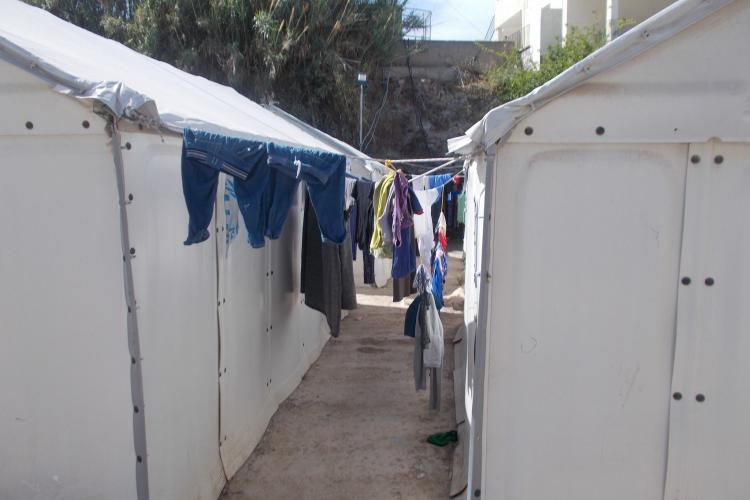
When residents try to ask the camp administration office or local authorities about their case, they tend to be simply told to wait. No one appears able, or willing, to share any concrete information about the status of asylum cases, or the likelihood of being transferred to the mainland. Furthermore, there are very few organisations that have the capacity to provide this type of guidance. Grassroots initiatives such as the Refugee Info Bus are doing invaluable work alongside other charities on the island, but their resources are simply not sufficient for the current level of needs among refugees there. Indeed, 86% of the refugees said that they have no access to information about their legal rights or opportunities to change their situation. Similarly, 78.3% of refugees reported that they have no access to information about European asylum law and immigration rules. Consequently, people live in complete uncertainty about their future, which appears to foster a strong sense of desperation and unnecessary frustration.
Fears and insecurities
Feelings of insecurity are widespread among refugees in Chios. About 85% of respondents surveyed by RRDP said that they do not feel safe. This is largely due to the risk of violence, and inadequate security measures. As a result of this security gap, refugees are exposed to the threat of three kinds of violence: police violence, citizen violence and violence between groups of refugees.
24% of respondents said they have experienced police violence. Random detention by police also appears to be commonplace, with many relating stories about refugees who were detained and beaten by police for no apparent reason. ‘I do not dare to leave the camp because police detain people arbitrarily - especially nearby the port,’ one refugee told us.
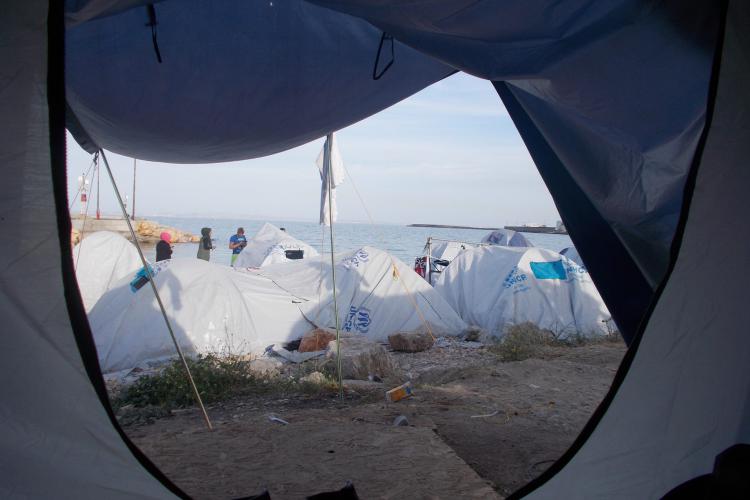
The level of citizen violence is slightly lower than that perpetrated by police, experienced by 21.7% of refugees. However, this form of violence appears to be more detrimental - in particular when conducted by a large group. Our researchers were informed of several instances of attacks by neo-Nazi or right-wing extremists. In spring 2017, extremists were known to have used stones and ‘Molotov cocktails’ against refugees, leaving many people hurt and some tents burned down.
Some 36.6% said they have experienced violence between refugees. Many reported that it is largely due to high levels of frustration, feeling forgotten in a miserable place with very little hope. Indeed, 23% have been living in the Chios camps for more than six months, leading to desperation and impatience. Many have experienced war and high levels of violence, a large number have been tortured prior to arriving in Chios, some have recently lost a family member, while others have chronic diseases or have seen their homes and savings destroyed.
Indeed, refugees in Chios are experiencing various forms of distress, including traumatic past experiences, a depressing present situation characterized by an absence of information, and an uncertain future including fear of deportation. These combined factors lead to depression and mental ill-health among thousands of people seeking protection in Europe.
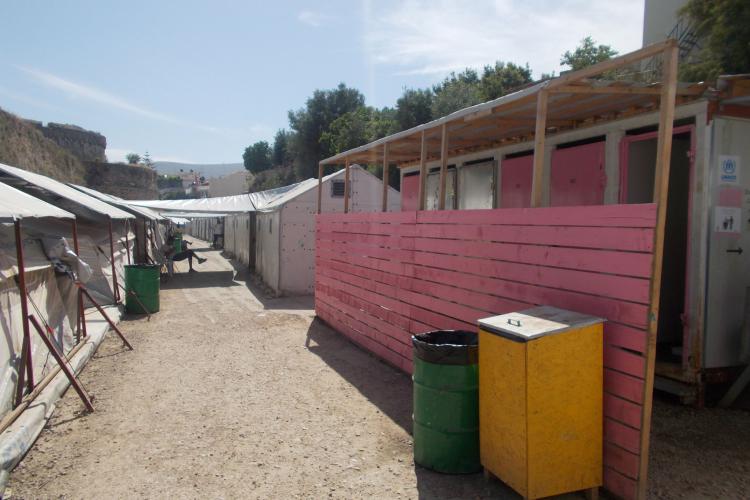
In light of these research findings, the EU Commission’s decision to withdraw humanitarian aid from the Greek islands in July 2017 appears wholly misguided. It is likely to force vital service providers - many of which have been receiving EU funding to-date - to leave the islands, handing full responsibility to the already over-stretched Greek authorities. As such, the decision disregards the principles of human rights which the European Union is otherwise keen to safeguard around the world, and risks having a detrimental impact on displaced people seeking sanctuary at Europe’s shores.
Update: On 10 July 2017, the European Commission approved 6.48 million euros towards emergency funding on Chios and Lesvos. This is a welcome development but one which needs to be accompanied by a strengthened asylum system and accelerated transfers to mainland Greece.
Any comments about this post? Get in touch with us! Send us an email, or post a comment here or on Facebook. You can also tweet us.
__________
How to cite this blog post (Harvard style)
Saoud,M. A. and Welander, M. (2017) Chios at Breaking Point: New Research Finds Humanitarian Support Must Be Strengthened, Not Withdrawn. Available at: https://www.law.ox.ac.uk/research-subject-groups/centre-criminology/centreborder-criminologies/blog/2017/07/chios-breaking (Accessed [date])
Share:








